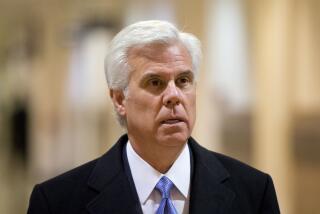State Charges Comark, Bank Mixed Funds
- Share via
Comark, a defunct Newport Beach-based government securities broker, and Marine Midland Bank of Buffalo, N.Y., have been accused by the California Department of Corporations of commingling customer and company funds in a civil lawsuit filed in Los Angeles Superior Court.
The suit, filed late Friday but made public Tuesday, alleges that Comark also failed to keep current and accurate books and records and fell substantially below the minimum net capital amounts required by the state to do business.
Comark, which filed for liquidation under Chapter 7 of the U.S. Bankruptcy Code in July, 1982, was formed in 1977 as a limited partnership. Its general partners collected about $40 million from about 170 investors.
Comark’s general partners, E. Keith Owens, former executive vice president of Newport Beach-based Monex International Ltd., and Robert W. Bell, chairman and majority owner of the San Diego Sockers soccer team, were named as defendants in the suit. Jack Haraburda, Comark’s former managing director, was also named.
Owens, Bell and Haraburda could not be reached for comment.
The suit alleges that Marine Midland, which acted as Comark’s clearing agent for sales of government securities, “caused the actual commingling” and “was the economic beneficiary of the arrangement through fees paid for its services.” Specifically, the suit charges the bank with unlawfully holding Comark and customer securities together in one account.
The suit also alleges that, on June 3, 1982, the bank sold a total of $27.1 million worth of securities owned by Comark and its customers because Comark owed the bank $20 million. Of the total securities sold, $23.9 million worth belonged to Comark customers. The suit also contends that Marine Midland retained a $1-million fee “without excuse, without authority or color of title to retain that amount.”
The state did not specify damages being sought in the lawsuit, but a Corporations Commission attorney said they could exceed $4 million.
More to Read
Inside the business of entertainment
The Wide Shot brings you news, analysis and insights on everything from streaming wars to production — and what it all means for the future.
You may occasionally receive promotional content from the Los Angeles Times.










